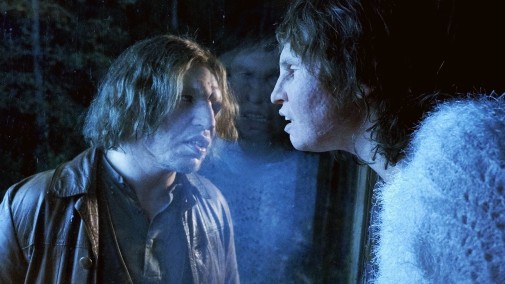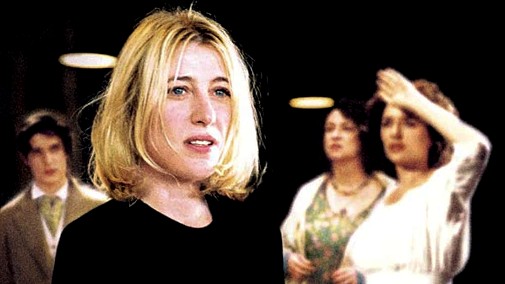Cannes at Home: Day 6 – Trolls, Actresses, and the Whole Shebang
 Tuesday, May 24, 2022 at 6:00PM
Tuesday, May 24, 2022 at 6:00PM Well, folks, it seems we have another strong contender for the Palme d'Or. If Cristian Mungiu's R.M.N had people whispering about awards possibilities, Ali Abbasi's Holy Spider upped the conversation considerably. It isn't the first time the Iranian-Danish filmmaker presented work at Cannes, though Border was relegated to the Un Certain Regard competition – which it won. That same day, Valeria Bruni Tedeschi showed her latest directorial effort, Forever Young. The actress-turned-director already competed for the Palme back in 2013 with A Castle in Italy. Nevertheless, like Abbasi, her first film to be screened at Cannes was slotted for the Un Certain Regard section. In 2007, Tedeschi won a Special Jury Prize for Actresses.
As one ponders these directors' latest accomplishments, let's look back at their first prize-winning Cannes experiences…

BORDER (2018)
Where the land of fantasy and mundane existence meet, that's where Border lives. Ali Abbasi's sophomore feature follows the same sort of tonal-bending gambit that characterized his debut, the pregnancy horror Shelley, as it situates a fairytale within the milieu of realistic character study. Fantastic impossibilities act as the conduit by which queer bodies, outsider identities, kinship of the displaced can be explored. While it smells like originality, these developments are nothing new. Genre trappings have long offered filmmakers an oblique entry point into matters too complicated for blunt drama, and Border is no different. Abbasi smartly perpetuates a tradition as ancient as the folklore that birthed its protagonists.
Under layers of Oscar-nominated special effects makeup, Eva Melander portrays Tina, a customs officer with a strange appearance and an even more peculiar sense of smell. Her hypersensitive can detect any contraband, an ability repurposed from its magical origins into another monetizable tool of modern society. One gets the idea that, if it weren't for her olfactory powers, Tina might be destitute. In any case, it's a boring life, made up of mind-numbing routine and cyclical abuse at the hands of "normal people" who look down on her with open disgust. Even those meant to love Tina regard the woman as an outsider, something that can be tolerated but never quite embraced. That is until she crosses paths with Vore.
For the first time, Tina finds someone like her, a radical recognition forever changing the course of her life and how she sees the world. Entangled in the couple's growing attachment, Border shapeshifts from lowkey drama into a blossoming romance. Then, it's a crime thriller, a metaphor for marginalized identities and the ethics of ethnic assimilation, social commentary falling back into a fable. Led by Melander's outstanding performance, the film expands its emotional scope with each passing minute. The final act may feel like a mild disappointment, failing to negotiate moral ambivalence and forcing Tina into a precipitous conclusion. However, it never stops feeling like a singular story told by a visionary artist, ambitious beyond belief and well worthy of applause.
Border is streaming on Hulu. You can also rent it on various platforms.

ACTRESSES (2007)
While this Cannes at Home project is meant as a gesture of cinema-loving celebration, sometimes one must face harsh truths. Like the fact Valeria Bruni Tedeschi is a much better actress than she is a director. She's also a better director than a writer, but that separation is less of a chasm than a hairline crack. Not to be shady, but I can't quite comprehend how the Cannes selection committee put A Castle in Italy in the Main Competition while far superior films - Coppola's The Bling Ring, Panh's The Missing Picture, and Diaz's Norte, etc. - were jettisoned to the Un Certain Regard program. Anyway, we're not here to discuss that misbegotten 2013 title.
Instead, Actresses is the subject at hand, a film that often feels like that later project's first draft. Beyond various cast members essentially playing the same character types, both scripts revolve around a neurotic Franco-Italian thespian coming to grips with her messy personal life and present childlessness. They're also in dialogue with 19th-century Russian theatre – Turgenev's A Month in the Country and Chekov's The Cherry Orchard – and dedicated to the same person, the director's brother Virginio. Only, what A Castle in Italy lacks in self-awareness, Actresses has in spades. Moreover, in this earlier iteration, Tedeschi feels adventurous behind the camera, mixing backstage melodrama with spurts of magical realism, ghostly apparitions, and hauntings from a fictional dimension.
Adept at making fun of herself, the picture's multi-hyphenated auteur plays a theater actress struggling to find her place in a production of Turgenev's most famous play. Chronically unsatisfied, she's a storm of navel-gazing histrionics, spending much of the movie annoying those around her and getting called out on her childish antics. The script appeals to the viewer's compassion without getting mawkish about it, following the other players' messy lives and their fed-up subjectivity. The portrayal of the theater's professional environment feels authentic, and the supporting cast excels. I especially loved Noémie Lvovsky's César-nominated turn and Valeria Golino's transient presence.
Of all the films in this series, Actresses might be the hardest to find. However, it's available on DVD in some regions.



Reader Comments (1)
I still think about BORDER on the regular I wish it weren't such a procedural at heart but all of its other elements are just so exciting.